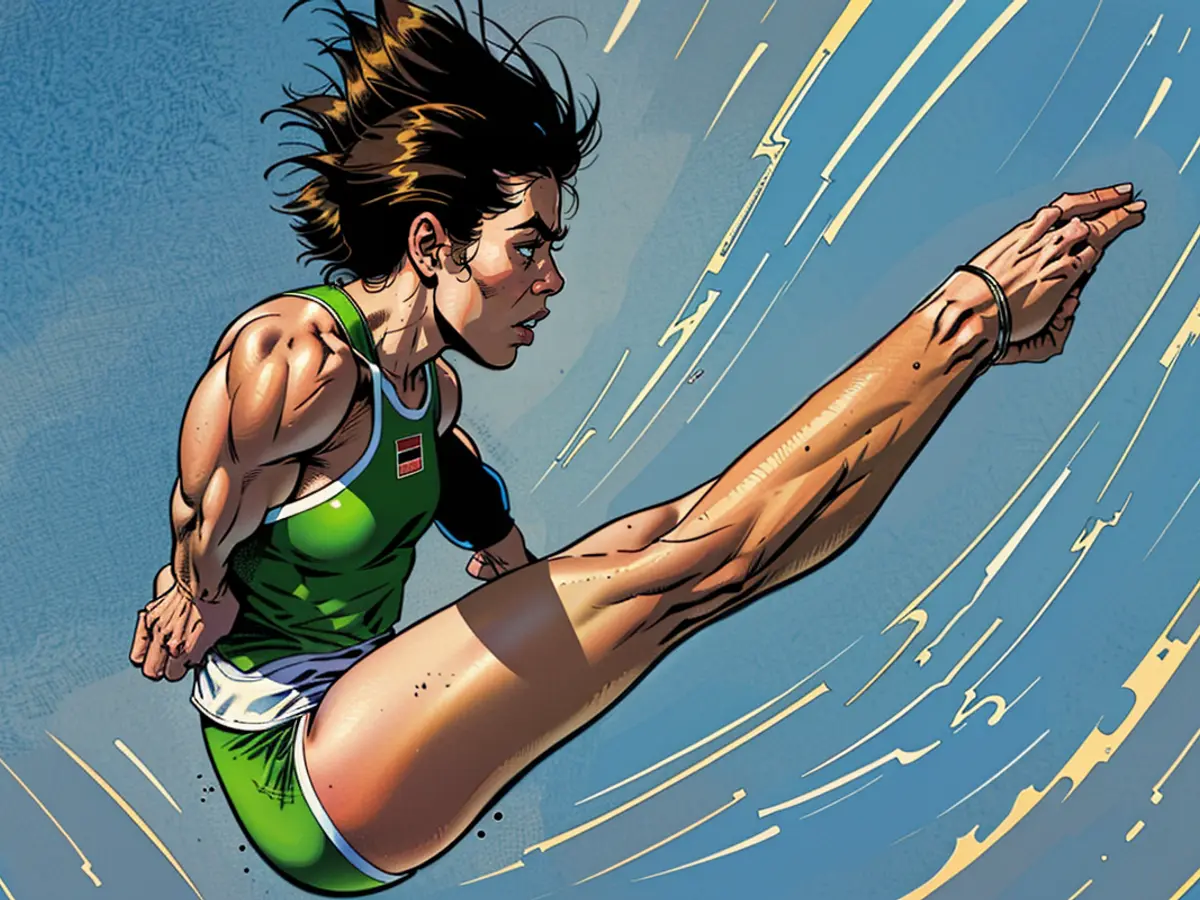Relentlessly drilled Chinese are close to perfection
In Diving, China is on a Gold Course. The Chinese aim to become the first country to win all gold medals in the Olympic discipline. For this, the athletes are driven to peak performances in the sports schools.
"This was the strongest competition of the year," said German diver Timo Barthel on Monday after six synchronized dives from the 10-meter platform of the "World". But he doesn't mean his own performance. Like many, Barthel is fascinated and thrilled by the dives of the Chinese.
With a flawless series of six synchronized dives, Lian Junjie and Yang Hao secured the gold medal in the men's 10-meter synchronized diving. The German diving duo faltered in their dives. Together with the 19-year-old Jaden Eikermann, Barthel finished seventh. Barthel was less upset about this and more admiring of the opposing performance: "I don't know if I've ever seen a 490. Super cool competition." No wonder, as diving has a tradition in China.
Eastern Domination: Olympic Gold for China
Diving has been an Olympic discipline since the Olympic Games in St. Louis in 1904. For more than half a century, the USA dominated the sport, which includes the disciplines of springboard diving, platform diving, and synchronized diving. But that changed in 1984.
For the first time after three decades of self-imposed international sports isolation, the leadership of the People's Republic of China sent more than 200 athletes to Los Angeles. Unexpectedly, the Chinese Zhou Jihong defeated her two American competitors, Michele Mitchell and Wendy Wyland, in the 10-meter platform diving with 435.51 points. The then 19-year-old thus won the first Olympic gold for China.
Since then, China has gradually but surely taken over the leading position from the USA in diving. The Chinese athletes have held the monopoly since the turn of the millennium. Since 1988, China has won 46 of the 60 possible gold medals in diving at the Olympic Games. And that's not without reason.
Dives in the Sign of Perfection
Even at the Olympic Games in Paris 2024, the Chinese are already at the top of the medal table in diving after just a few competition days: In two of the two competitions held so far, the Chinese have triumphed. Six medals are still to come.

One of them was won by Yang Hao and Lian Junjie on Monday in the men's 10-meter synchronized diving. With a score of 490.35, the Chinese men's duo dethroned the competition from Great Britain. Tom Daley and Noah Williams won silver with 463.44 points. The 26-year-old Yang Hao and the 23-year-old Lian Junjie have dominated the discipline for years. Nevertheless, they stood on the Olympic podium for the first time in Paris.
Their dives were characterized by precision, synchronization, and their high degree of difficulty - they almost approached perfection and received the corresponding points. In their last dive and the most difficult exercise of their program, a forward 3.5 somersault with almost perfect entry, which brought in the highest score of the competition on Monday with 103.23 points, they showed their entire skill.
German Diver Barthel: "They know nothing else but diving"
Even more perfect was a Chinese men's pair eight years before them: At the Olympic Games in Rio, the Chinese won the gold medal with 496.98 points.
Given Text (English to English):
In Light of Years of Dominance, German Diver Barthel Unsurprised by Chinese Excellence in Diving
German diver Barthel is not surprised by the outstanding performances of the Chinese divers at the Centre Aquatique. Speaking to "The World", he describes the regimented life of Chinese divers. "They live in a boarding school, four to a room. They train for twelve hours. They know nothing but diving," Barthel said. The Chinese diving youth has no private life. "Some of them don't see their families for three years," Barthel told "The World".
This, he believes, is the difference between absolute world-class and the performance of German divers. "But the question is also: Do you want that? Do you want that kind of life to get gold?" he added.

Training Report: With a Cane Behind the Back
But the boarding schools Barthel speaks of are not new: State-run sports schools have existed in China since 1956. Under Mao Zedong, China developed a high-performance sports system modeled on the Soviet Union, with schools where students are educated and trained to achieve peak performance in the afternoons.
Reports about Chinese sports training centers often shock. During the 2016 Olympic Games, "TIME Magazine" reported on the state-run sports school Huangshi in central China's Hubei province. As soon as young athletes are out of diapers, they are molded into perfect athletes at state sports academies, aiming to bring China glory in the form of gold medals.
The "TIME Magazine" report describes a lesson with Chinese diving coach Yu Lianming at the Huangshi school. She trained boys and girls, some as young as four. One of them is Tang Zixuan. The girl is confident about her future success in diving. "I enjoy eating bitterness," she told "TIME Magazine" at the time. "Eating bitterness" is a Chinese expression for enduring hardship or even suffering without complaint. And this phrase has been internalized by the five-year-old as her recipe for success.
"TIME Magazine" also reported on the blisters and calluses of the children. A kind of cane is even mentioned: While Yu Lianming's husband walks through the rows of students, he holds a long red stick behind his back, according to the report. But the children don't seem to worry about the impending punishment, it continues.
The Lamentable Price of Perfection
Without complaint, Chinese elite athletes achieve top performances. But this also comes at a price. This includes muscle injuries. Many divers also suffer from eye problems due to the long time they spend in the water during training, as "TIME Magazine" writes.
Even a former student of coach Yu Lianming had to endure pain for Olympic gold: In the early 2000s, Yu Lianming discovered the talent of then seven-year-old Liu Huixia. During preparations for Rio, she suffered a severe shoulder injury at the end of July in the training center. Nevertheless, the team expected her to continue and she did, winning gold in the women's synchronized 10-meter platform event with Chen Ruolin.

At the 2024 Olympic Games in Paris, the Chinese diving team aims to finally achieve their long-term goal: all eight gold medals in diving should go to Chinese divers. But to do this, they will have to deliver perfect dives in the coming competition days.
"Indeed, the Chinese diving team's dominance at the Olympic Games is no secret. This strategy of intense training and dedication began decades ago, as Barthel mentioned, with athletes living in boarding schools and training for twelve hours a day."
"The ambition of the Chinese diving team to win all gold medals in the Olympic discipline is a testament to their dedication and the results of their rigorous training regimen, a approach that has been in place since the establishment of state-run sports schools in China in 1956."








